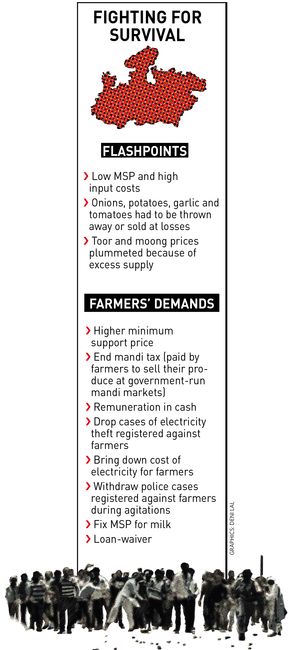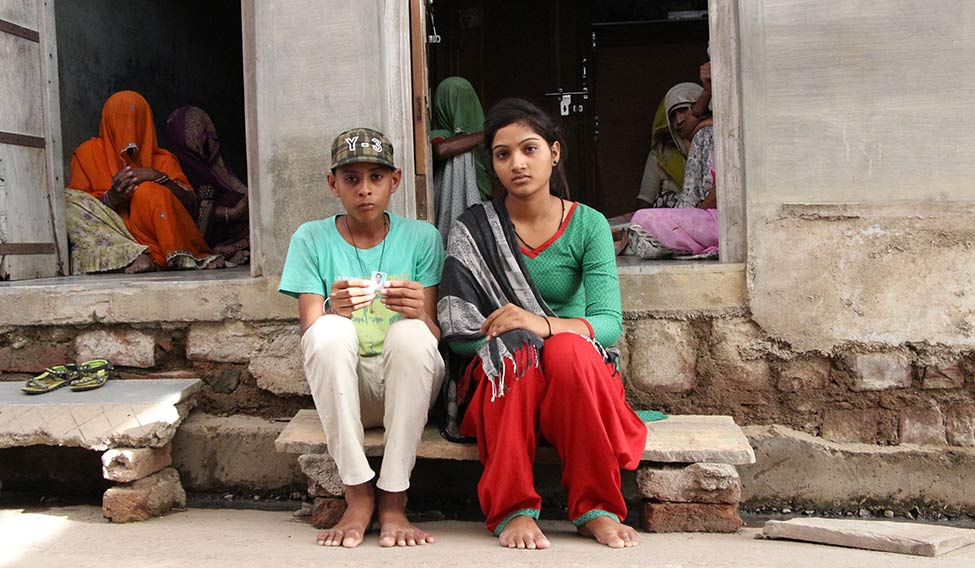Na mare, na motai [He neither dies nor gets healthy].”
-A Hindi proverb often used to describe the farmer in Madhya Pradesh
The success story of agriculture in Madhya Pradesh is full of paradoxes. The state won the Union government’s Krishi Karman Award for wheat production for five consecutive years. But, more than 18,000 farmers have committed suicide between 2001 and 2015. The BJP, under Chief Minister Shivraj Singh Chouhan, has won three consecutive assembly polls since 2003, thanks largely to his popularity among the agricultural class. Yet, on June 6, five people were killed in police firing in Pipliya Mandi, Mandsaur, during a protest demanding an increase in the minimum support price (MSP) for crops and a loan waiver. Another farmer died of injuries, allegedly because of police action.
In a state where the share of agriculture in total GDP is over 30 per cent, farmers are an important vote bank. So, the state government never missed an opportunity to appease them. When the Centre had declared Rs 1,500 as MSP of wheat, the state gave an additional Rs 200 on each quintal. It is another matter that the Narendra Modi government ended the bonus practice.
Chouhan has been generous with the farmers in distress, but his pro-farmer image has been dented, with Madhya Pradesh—BJP’s model farmer welfare state—witnessing one of its worst farmer agitations. More than 200 vehicles have been torched. Now, farmer organisations have threatened to block the national highways on June 16.
The farmers’ agitation began on June 1 after more than 60 organisations decided to hold a ten-day strike. It spread like wildfire to half of the state’s districts following the Mandsaur shooting. Among those killed in the police firing was Punamchand Patidar, 23, of Takrawad village. Following his father’s death last year, he had to juggle his studies and farming. A few months ago, his mother fell ill, and he took a loan of Rs 50,000 for her treatment. He had to take the loan as he was unable to encash a cheque of Rs 10,827 he had received from the local trader for his coriander and garlic crop. The UCO Bank cheque issued by the trader was deposited at the Punjab National Bank, where Punamchand had an account. He had been waiting for the money for 20 days, and would visit the bank every third day, said his cousin Balaram Patidar. Punamchand joined the protestors after yet another futile visit to the bank. “This is not an isolated case,” said Vinod Patidar, a community leader and farmer. “The local traders have connived with bank officials to delay the payment of cheques. We started facing this problem ever since the demonetisation.’’
Abhishek Patidar and his brother Madhusudan, residents of Barkheda Panth village, were mere spectators at the protest. “The police resorted to firing without giving any notice,” said Madhusudan. “My brother was shot twice, first in the stomach and then in the back.” Abhishek aspired to be an armyman and would go on morning jogs and take special classes for writing exams.

According to eyewitnesses, the situation turned tense when a trader, Anil Gheewala, brutally beat a farmer, which was caught on camera. The trader then went to the police station to register a case against farmers and called up local BJP leaders for help. Infuriated, the farmers surrounded the police station. The farmers turned violent as they thought the police was favouring traders. When the mob started burning vehicles and shops, the police started firing at them.
Chainram Patidar, 23, from Nayakheda hamlet, too, was a bystander when he was killed in the police firing. Like Abhishek, he also wanted to join the Army. Chainram got married on April 29; his wife, Pushpa, is in a state of shock. “Life has played a bad joke on me,” said Chainram’s father, Ganpat Patidar, who owns two bighas and works as a farm labourer. “I lost my land to government acquisition for a dam. Now my son has been killed.”
Kanhaiyalal Patidar, 38, of Chillod Pipliya, was killed in cold blood, said his brother Jagdish. Even as he was called for talks, the police opened fire. The villagers are now planning to erect a memorial in his name.
The only non-Patidar to be killed in the firing was Satyanarayan Dhangar of Lodh village. Youngest of four siblings, he had dropped out of school and worked as a labourer. His father owned a small piece of land, but that was too little for his big family.
Ghanshyam Dhakad, 32, of Badwan village died a day after the police firing. According to his friend Rajesh Dhakad, Ghanshyam was arrested while they both were on their way to a temple. He was allegedly beaten by the police, and was later admitted to a hospital, where he succumbed to his injuries. A marginal farmer, Ghanshyam used to run a small pesticide shop to support his family. On hearing the news of his death, his wife tried to commit suicide.
Initially, the state government denied that farmers were killed in police firing. However, the chief minister later announced a compensation of Rs 5 lakh each, which was increased to Rs 10 lakh and finally to Rs 1 crore. The police, however, have registered 43 cases against the protestors, and have arrested 259 people.
The increase in compensation was seen by many as an afterthought. Anita Bai, Punamchand’s wife, said: “They are giving Rs 1 crore for the death of my husband, who was innocent. I will give Rs 10 crore. Will they return my husband?” Ganesh Patidar, a veteran community leader, said the declaration of compensation and calling protestors criminals have insulted the farming community.
“We farmers don’t get the actual price for our produce because the officials at the mandi market do not buy our produce at the right time,” said Ashok Kumar Patidar of Chillod Pipliya. “They create a situation where we have sell it to traders at a lower price.” Last year, garlic was sold for Rs 5,000 to Rs 7,000 per quintal. This year though, traders said they would only pay Rs 2,000 per quintal.
Traders, too, are unhappy after they lost their property during the agitation. Garment businessman Sudhir Jain’s shop in Pipaliya Mandi was burnt by protestors. “While the government sees farmers as a vote bank, don’t we or the common man vote for the government, too?” he asked.
It has come down to the politics of votes. Congress vice president Rahul Gandhi, his party leader Jyotiraditya Scindia, and Hardik Patel, who heads the Patidar Anamat Andolan Samiti, tried to meet the families of deceased farmers, but they were detained well before they could reach Mandsaur.
To counter the opposition, Chouhan sat on a 28-hour ‘peace fast’, at the end of which he announced that buying agricultural produce below MSP will be treated as a crime. Also, 50 per cent of the payments to farmers in government mandis will be done through cash. Later, he also met the families of the deceased farmers. But these measures have done little to calm the farmers, as three suicides were reported in 24 hours on June 13.
A senior minister, however, had a different take on the situation: “This protest and unrest is essentially against the Modi government. We are unnecessarily getting crushed. Most of the demands of farmers are related to the Union government.”







